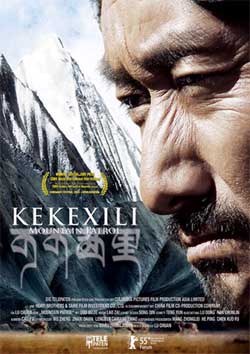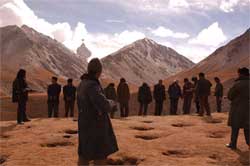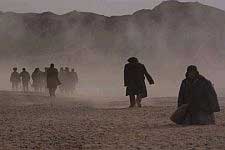The Searchers: Asian American Film Festival (Part 6)
 |
"Tibetans always point knives towards themselves."
-- Ritai, Kekexili: Mountain Patrol
Reviewing a mainland China film can be an interesting, if sometimes tortuous, exercise. Still a monolithic, forbidding nation in our eyes, China and its films are dissected by critics from every conceivable political angle: How did this work clear the official censors? What messages within can be interpreted as supporting the current regime? Or: Are there signs of resistance to the party line in this film? Where is the subversion? This can lead to enlightening commentary -- see the early works of Zhang Yimou and Chen Kaige, which escaped censure by locating their narratives in long-ago China -- or it can lead to shortsighted conclusions (see the hulabaloo about Zhang's Hero, which many read as an endorsement of the current Communist leadership's strong-arm tactics, while conveniently forgetting that tyranny has existed since time immemorial -- sometimes an emperor is just an emperor).
In the case of Lu Chuan's KeKexili: Mountain Patrol, which turned out to be the one film I saw at the Asian American Film Festival that has been guaranteed local U.S. distribution (through no less than National Geographic), the desire to dissect seems particularly apt. The story, based on true events, is a government public relations dream: In the early 90s, ruthless poachers slaughtered thousands of Tibetan antelope in the great northwestern plateau of Kekexili for their pelts. With the antelope on the verge of extinction, an under-funded and under-equipped band of locals formed a militia to thwart the interlopers. Their struggles brought to light by a young journalist from Beijing named Ga Yu (portrayed by Zhang Lei in the film), the government ultimately designated Kekexili as a wildlife preserve, bringing the antelope back from the brink -- and they all lived happily ever after (well, not exactly, but in the self-congratulatory end titles slapped on at the close of this movie, it certainly feels that way).
If painting a picture of benevolent government helps China's leaders sleep better at night, so be it -- it's certainly no worse than the typical song and dance any government trots out to placate the skeptical masses. But it stands in stark opposition to what the film is really about: nature and man (stress the "man") under stress.
 |
After a brutal opening sequence in which poachers slaughter a host of antelope and kill a patrolman, we are introduced to Ga Yu as he arrives in the area and meets militia captain Ritai (played with leathery authority by Duobuji). Initially suspicious of Ga and his desire to report on the troubles in the region to a national audience, Ritai has barely enough time to soften his attitude before he and his men bundle into two rickety jeeps with Ga in tow. Their mission: track down and arrest the bandits responsible for the patrolman's death, even though they could be anywhere in the vast, three-mile-high tundra.
As that synopsis indicates, Kekexili is not the environmentalist polemic it has been pegged as, but a modern Western, and is interested in humans first and foremost. Save for the opening scene and a few mercifully brief shots of carcasses, the Tibetan antelope are nowhere to be seen. Instead, we become acquainted with the lives of these hardy locals, the way they dance and sing to keep their spirits up, the essential loneliness of their quest. Cinematographer Cao Yu, who had to brave extreme conditions to shoot the movie, deserves some kind of medal for his work, as the plateau stretches out empty and forbidding in all directions, like an alien moonscape. Within this stark setting, the posse is often framed as tiny figures, dwarfed by the elements. Here, a simple flat tire or unexpected storm can spell the difference between life and death, and as the calamities accumulate, the quest grows more protracted and desperate, the rations and gas run low, and the men are forced to violate their principles and even sell antelope pelts to continue the journey, the tale becomes one of outright survival, in which considerations of catching bandits and doing the right thing are afterthoughts.
 |
 |


0 Comments:
Post a Comment
<< Home